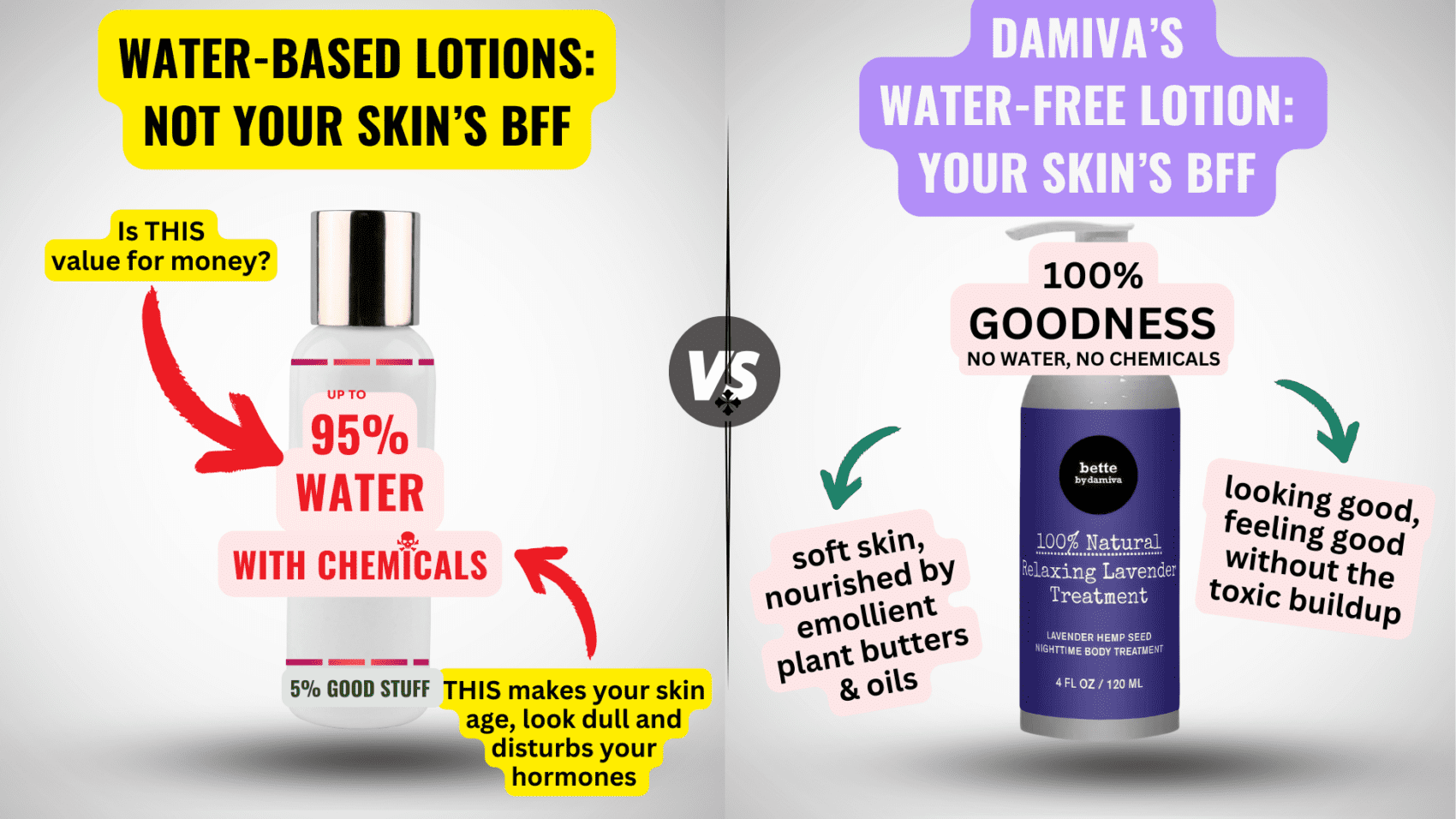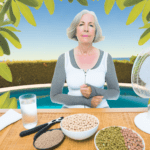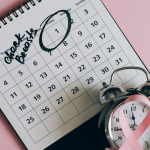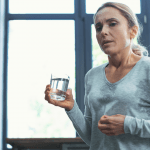Breast Soreness and Menopause
Mastalgia, commonly known as breast pain, is a condition experienced by many women and can be categorized into two main types: cyclical and noncyclical. Cyclical mastalgia is associated with the menstrual cycle, characterized by a dull ache that affects both breasts and often occurs just before menstruation. Noncyclical mastalgia, on the other hand, does not correspond with the menstrual cycle and can be constant or intermittent, affecting one or both breasts. As women approach menopause, they may experience a shift from the familiar cyclical pain to more sporadic and unpredictable breast soreness.
The Menopausal Transition: Perimenopause to Menopause
The journey from perimenopause to menopause marks a significant hormonal shift in a woman’s body. Perimenopause is the precursor to menopause, typically beginning in a woman’s 40s, and is characterized by irregular menstrual cycles. Menopause is confirmed after a woman has not experienced a menstrual period for twelve consecutive months, usually around the age of 51 in the United States. During this transition, the body’s production of estrogen and progesterone fluctuates and eventually decreases, leading to various symptoms, including breast soreness.
Symptoms Accompanying Breast Soreness in Menopause
Menopausal breast soreness often presents differently from the pain experienced during the reproductive years. It may feel like a burning sensation or soreness, and can be localized to one breast or affect both. This discomfort is just one of several symptoms associated with menopause, which may also include hot flashes, night sweats, vaginal dryness, and mood changes. It’s important to note that breast pain during perimenopause and menopause can also lead to tenderness or sensitive areas within the breasts.
Differentiating Menopausal Breast Soreness from Other Breast Pain
While menopausal breast soreness is typically due to hormonal changes, it’s crucial to differentiate it from other types of breast pain that may signal different health conditions. For instance, breast infections, cysts, and certain medications can cause breast discomfort. Moreover, although rare, breast cancer can present with breast soreness, especially if accompanied by a lump, nipple discharge, or changes in breast appearance. Therefore, it is essential for women to consult with a healthcare provider if they experience new or concerning symptoms alongside breast soreness, to rule out other potential causes and receive appropriate care.
Hormonal Fluctuations and Breast Discomfort
Role of Estrogen and Progesterone in Breast Tissue
The breast tissue is highly sensitive to hormonal changes, particularly to the hormones estrogen and progesterone. These hormones play a crucial role in the development and function of breast tissue. Estrogen stimulates the growth of the ductal system, which is responsible for transporting milk, while progesterone supports the development and maintenance of the lobules and alveoli, where milk is produced and stored. Together, these hormones prepare the breast for potential lactation and are also involved in the monthly changes women experience in their breast tissue related to the menstrual cycle.
How Hormonal Changes Cause Breast Soreness
During the perimenopausal transition, levels of estrogen and progesterone become erratic and unpredictable, leading to a range of symptoms including breast soreness or mastalgia. This discomfort is often due to the hormonal fluctuations causing the breast tissue to swell and retain fluid, leading to tenderness and pain. The soreness can vary from a dull ache to a more intense burning or throbbing sensation and may affect one or both breasts. As women progress into menopause, the overall decrease in estrogen levels may lead to a reduction in breast density and size, which can also contribute to discomfort.
Impact of Hormone Therapy on Breast Pain
Hormone therapy (HT) is often prescribed to alleviate menopausal symptoms, including hot flashes and vaginal dryness. However, its impact on breast soreness can be complex. For some women, HT may actually exacerbate breast pain due to the introduction of hormones that the body is no longer producing at the same levels. It is important for women to monitor their breast discomfort and discuss any changes with their healthcare provider when on HT. Adjustments to the type or dosage of hormone therapy may be necessary to manage breast soreness effectively.
In conclusion, the hormonal roller coaster of perimenopause and menopause can significantly impact breast tissue, leading to soreness and discomfort. Understanding the role of estrogen and progesterone, recognizing how hormonal changes contribute to breast pain, and being aware of the potential effects of hormone therapy are essential for managing this common symptom of menopause.
Other Potential Causes of Breast Soreness
Medications and Breast Pain
While hormonal changes are a primary cause of breast soreness during menopause, certain medications can also contribute to this discomfort. Medications that may induce breast pain include:
- Antidepressants: Particularly selective serotonin reuptake inhibitors (SSRIs).
- Cardiovascular drugs: Such as those used for treating high blood pressure.
- Hormone therapies: Including hormone replacement therapy or oral contraceptives.
- Diuretics: Often prescribed to manage fluid retention and high blood pressure.
Consulting with a healthcare provider about the side effects of current medications is crucial, as adjustments may alleviate breast soreness.
Breast Infections and Cysts
Infections within the breast, such as mastitis, can cause pain and swelling, typically accompanied by redness and possibly fever. Breast cysts, fluid-filled sacs, are another noncancerous condition that can cause tenderness or discomfort. While cysts are more common during the reproductive years, they can also occur during perimenopause and may persist if a woman is on hormone therapy.
Physical Factors: Bra Fit and Body Weight
Physical factors play a significant role in breast soreness. An ill-fitting bra, especially one that lacks proper support, can lead to discomfort. Ensuring a correct bra fit is essential, as breast size and shape can change during menopause. Additionally, weight gain, which is not uncommon during menopause, can increase breast size, potentially leading to soreness due to the added weight and strain on breast tissue.
Breast Cancer Concerns and Symptoms
Although most breast pain is not indicative of cancer, it is a concern that should not be ignored. Symptoms that may warrant further investigation include:
- A new lump or mass in the breast.
- Unexplained changes in breast size or shape.
- Changes in the skin over the breast, such as dimpling.
- Nipple discharge or inversion.
It is essential to report any new or unusual breast changes to a healthcare provider promptly for evaluation. Regular screenings and mammograms are critical for early detection of breast cancer and should be part of routine health care.
In conclusion, while menopausal hormonal changes are a common cause of breast soreness, other factors such as medication side effects, infections, cysts, physical factors like bra fit and body weight, and the potential for breast cancer also contribute to breast discomfort. Understanding these causes can help women seek appropriate treatment and maintain breast health during menopause.

Diagnosing Breast Soreness
What to Record in a Breast Pain Journal
Keeping a detailed breast pain journal is a proactive step you can take when experiencing breast soreness. This journal should include:
- The frequency and duration of the pain
- The location of the pain, whether it’s localized or widespread
- The type of pain (sharp, burning, dull ache)
- Any activities that exacerbate or alleviate the pain
- Associated symptoms such as swelling, redness, or nipple discharge
- Any medications or supplements you are taking
- Lifestyle factors that may influence the pain, such as dietary habits or stress levels
Documenting these details can help your healthcare provider pinpoint the cause of your breast soreness and determine the best course of action.
Clinical Breast Exams and Imaging Tests
During a clinical breast exam, a healthcare professional will manually examine your breasts for lumps or other abnormalities. If further investigation is needed, imaging tests such as a mammogram or ultrasound may be ordered. These tests can help distinguish between different types of breast tissue and identify any suspicious areas that may require a biopsy.
Biopsy Procedures and Analysis
If a lump or abnormal area is detected in the breast, a biopsy may be necessary. This procedure involves removing a small sample of breast tissue for laboratory analysis. There are several types of biopsy procedures, including:
- Fine-needle aspiration: A thin needle is used to extract fluid or cells from a breast lump.
- Core needle biopsy: A larger needle is used to remove a tissue sample from the breast.
- Surgical biopsy: A surgical procedure to remove part or all of a lump for examination.
The tissue sample is then examined by a pathologist to determine if it is benign or cancerous. The results of the biopsy will guide your healthcare provider in developing a treatment plan tailored to your specific condition.
It is essential to remember that while breast soreness can be a symptom of menopause, it is also important to rule out other potential causes. By keeping a detailed journal, undergoing clinical exams, and, if necessary, having a biopsy, you can work with your healthcare provider to understand the cause of your breast soreness and find the most effective treatment.
Treatment Options for Menopausal Breast Soreness
Over-the-Counter and Prescription Medications
For many women experiencing breast soreness during the menopausal transition, over-the-counter (OTC) pain relievers can provide significant relief. Common OTC options include ibuprofen (such as Advil or Motrin IB) and acetaminophen (Tylenol). These medications can help reduce inflammation and alleviate pain. However, it’s important to use them as directed and consult with a healthcare provider, especially if you have any underlying health conditions or are taking other medications.
In some cases, prescription medications may be necessary. Your doctor might prescribe a different class of pain relievers or other drugs that target specific symptoms or underlying causes of breast soreness. Hormone therapy is another prescription option that some women consider for managing menopausal symptoms, including breast pain, although it may not be suitable for everyone due to potential side effects and risks.
Alternative Treatments and Their Efficacy
Alternative treatments, such as herbal supplements, are sought by some women who prefer natural remedies or wish to avoid traditional medications. Evening primrose oil is one such supplement that is sometimes recommended for breast pain, although scientific evidence supporting its effectiveness is limited. It’s crucial to discuss with a healthcare provider before starting any supplement, as they can interact with other medications and may not be safe for everyone.
Other alternative approaches include dietary changes, such as reducing caffeine intake, which some women find exacerbates breast soreness. While these methods may not have robust scientific backing, they are generally low-risk and may provide relief for some individuals.
Lifestyle Adjustments for Pain Relief
Lifestyle adjustments can play a significant role in managing breast soreness during menopause. Wearing a well-fitting, supportive bra can minimize discomfort, especially during physical activity. Ensuring proper bra fit is essential, as an ill-fitting bra can contribute to pain.
Additional lifestyle tips include:
- Applying a warm compress to the breasts or taking a warm shower to soothe discomfort.
- Limiting or avoiding caffeine and smoking, both of which can aggravate breast soreness.
- Maintaining a healthy weight, as excess body weight can increase the strain on breast tissue.
- Engaging in regular exercise, which can improve overall health and may help reduce certain menopausal symptoms.
It’s also beneficial to review any current medications with your healthcare provider to determine if they could be contributing to breast soreness and to discuss possible adjustments to your treatment plan.
While these treatment options can be effective for many women, it’s important to remember that individual responses can vary. What works for one person may not work for another, and a combination of treatments may be necessary to find relief. Always consult with a healthcare provider to tailor a treatment plan that is right for your specific needs and circumstances.

THEN IT CONTAINS TOXIC CHEMICALS. WHY RISK IT GETTING SICK? GO CHEMICAL FREE.
When to Seek Medical Advice
Self-Treatment Limitations and Professional Consultation
While many symptoms of menopause, including breast soreness, can often be managed with over-the-counter medications, lifestyle changes, and home remedies, there are limitations to self-treatment. It is essential to recognize when these methods are insufficient and professional medical advice is necessary. If breast discomfort persists despite self-care measures, or if it significantly impacts your quality of life, consulting a healthcare provider is crucial. They can offer a thorough evaluation and discuss prescription options or further interventions that may be more effective. Additionally, if you are considering alternative treatments or supplements, it is important to discuss these with your doctor to avoid potential interactions with other medications you may be taking.
Identifying Serious Symptoms Requiring Immediate Attention
While breast soreness is a common symptom of menopause, certain signs should prompt immediate medical consultation. These include:
- Unusual nipple discharge, especially if it is clear, bloody, or pus-like.
- Changes in breast size or shape, including redness or other noticeable changes in the skin or appearance of the breast.
- A lump or thickened area in the breast or underarm.
- Persistent, unexplained breast pain that does not follow a cyclical pattern or is localized to one specific area.
- Signs of infection, such as fever or localized warmth and redness.
- Chest pain or other symptoms that could indicate a heart condition.
If you experience any of these symptoms, it is imperative to seek medical advice promptly to rule out more serious conditions, such as breast cancer or heart disease.
The Importance of Regular Medical Check-Ups
Regular medical check-ups play a vital role in monitoring your health during menopause. These appointments provide an opportunity for healthcare providers to detect any potential issues early on. Mammograms and clinical breast exams should be part of routine health screenings, with the frequency determined by your age, family history, and personal risk factors. Your healthcare provider can also offer guidance on how to perform self-exams, which can help you become familiar with the normal texture and appearance of your breasts, making it easier to notice any changes. Remember, early detection of any abnormalities is key to successful treatment and outcomes.
In conclusion, while self-care is valuable for managing menopausal symptoms, it is essential to be vigilant about changes in your breast health and to seek professional medical advice when necessary. Regular check-ups and open communication with your healthcare provider will support you in navigating breast soreness during menopause with confidence and peace of mind.

Popular Read
Conclusion: Navigating Breast Soreness During Menopause
Summarizing Key Points on Menopausal Breast Soreness
Throughout the menopausal transition, many women experience breast soreness, a condition medically known as mastalgia. This discomfort is often due to the hormonal fluctuations characteristic of perimenopause, where estrogen and progesterone levels can vary significantly. Unlike the cyclic breast tenderness associated with menstruation, menopausal breast soreness can manifest as a more persistent throbbing or burning sensation. It’s important to differentiate this common symptom of menopause from other potential causes of breast pain, such as infections, cysts, or, more rarely, breast cancer.
Encouraging Proactive Health Management
Proactive health management is crucial for navigating breast soreness during menopause. Regular self-examinations are essential for becoming familiar with the normal feel of your breast tissue, thus enabling the early detection of any unusual changes. Lifestyle adjustments, such as maintaining a healthy weight, reducing caffeine and alcohol intake, and wearing a well-fitting bra, can also provide relief. Additionally, certain medications, including hormone therapy, may contribute to breast discomfort, and a healthcare provider can offer guidance on managing these effects.
Final Thoughts on Addressing Breast Pain
While menopausal breast soreness is a common and typically benign symptom, it is important to remain vigilant about breast health. Any persistent pain, new lumps, or changes in breast appearance should prompt a consultation with a healthcare provider. Remember that breast pain is rarely indicative of cancer, but it should never be ignored. With the right approach, which may include over-the-counter medications, alternative treatments, or lifestyle changes, relief can be found. Ultimately, understanding the nature of breast soreness and being proactive in health management can help women navigate this symptom more comfortably during menopause.










